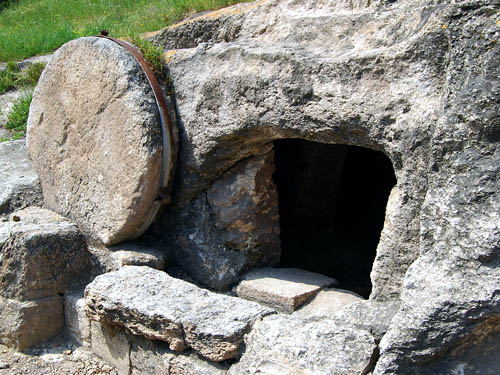4/8 "The Mystery of Godliness" 1 Tim. 3:16, 14-15
 In a Nutshell: Trying to create a "godly" (or good) population has gone on for Millennia. You start by figuring out what to do with those that are evil. Empires tend to imprison them, Tyrannies execute them, and Democracies try to educate them. Jesus died for them! For the first 4,000 years that was quite the mystery.
In a Nutshell: Trying to create a "godly" (or good) population has gone on for Millennia. You start by figuring out what to do with those that are evil. Empires tend to imprison them, Tyrannies execute them, and Democracies try to educate them. Jesus died for them! For the first 4,000 years that was quite the mystery.
Ice Breaker: Think of the husband wife team that refused to give up during hard times... did the change come because one or both were forced to change against their, or because they wanted to? What's the difference?
Texts: 1 Timothy 3:16,14-15
CONNECTING TO THE TEXT
1 Tim. 3:16,14-15 - 16 Great indeed, we confess, is the mystery of godliness: He was manifested in the flesh, vindicated by the Spirit, seen by angels, proclaimed among the nations, believed on in the world, taken up in glory. - 14 I hope to come to you soon, but I am writing these things to you so that, 15 if I delay, you may know how one ought to behave in the household of God, which is the church of the living God, a pillar and buttress of the truth.
In this text it is important to remember that up until the previous 30 years before Paul wrote this no one had conceived of a person's goodness coming from the life, death and resurrection of a son of a God. A god killed by men was anything but a victory!
- How might the meaning of the first sentence change depending on where you put the emphasis, "great is the mystery?" or "great is the godliness?" (which to that point had remained a mystery)
- If you were to give the "mystery of godliness" a name what would it be? Hint: who was "manifested," "vindicated," "seen by angels," "proclaimed to outsiders," "believed in all cultures," "taken up?"
- Define the terms and describe Bible stories where these terms can be seen in Jesus' life/ministry. (manifested in the flesh - Jn. 1:14; vindicated by the Spirit - Rom. 1:4; seen by angels - Lk. 22:43; proclaimed among the nations - Ac 8:5,6; believed in the world Col. 1:6; taken up in glory - Ac. 1:8)
- What does Paul call "the church?" 1 Tim. 3:15
- Why did Paul write what he did in 1 Timothy chapter 3? (see vs. 14)
- How "ought one behave in the household of God?" 1 Tim. 3:1-13
REFLECTING ON OUR LIVES
- What means have people utilized through the centuries in effort to cause people to be good, or "godly?" (Think about historical events/people/stories, even Mom & Dad!)
- Do we typically think of 1 Tim. 3:1-13 as a standard of "behavior" for all Christians? Why or why not?
- Why do you think the story and sacrifice of Jesus is so much more effective at establishing a standard of "behavior" than a set of rules?
- How should these principles effect your perspective as a parent? As a spouse? As a boss? As an employee? As a church leader?
REFLECTING ON THE WAY WE DO CHURCH
- How can the church take this story of Jesus, which has not been a mystery for over 2,000 years, and recreate a sense of a newly revealed mystery which is "beyond debate a great new revelation"?
THE CHOICE IS YOURS...
Do you acknowledge Jesus' death as your atonement for sin and embrace His sacrifice as your motivation to live a godly life? The way you live is your answer, not the way you talk...